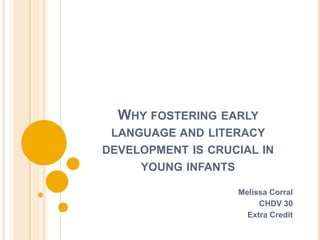Language and Literacy
•Télécharger en tant que PPTX, PDF•
4 j'aime•3,235 vues
Signaler
Partager
Signaler
Partager

Recommandé
Recommandé
Contenu connexe
Tendances
Tendances (20)
Theories of learning and early literacy (definition, characteristics, transit...

Theories of learning and early literacy (definition, characteristics, transit...
FIRST LANGUAGE ACQUISITION AND SECOND LANGUAGE ACQUISITION

FIRST LANGUAGE ACQUISITION AND SECOND LANGUAGE ACQUISITION
En vedette
En vedette (20)
The Impact of a Vision Impairment on sensory, motor, communication and congit...

The Impact of a Vision Impairment on sensory, motor, communication and congit...
Stages of children development and the related theories

Stages of children development and the related theories
Story-Based Approach to Teaching Preschool English

Story-Based Approach to Teaching Preschool English
Understanding Socio-Economic Disadvantage and its impact on student learning,...

Understanding Socio-Economic Disadvantage and its impact on student learning,...
Similaire à Language and Literacy
Similaire à Language and Literacy (20)
How to teach languages to toddlers and preschoolers 

How to teach languages to toddlers and preschoolers
Week 1Hi my name is Gloria, I am sixty three years old, and I pl.docx

Week 1Hi my name is Gloria, I am sixty three years old, and I pl.docx
Chicago style course work language development hypotheses

Chicago style course work language development hypotheses
A Wealth of Words: Building Language, Literacy, Culture and Community in Earl...

A Wealth of Words: Building Language, Literacy, Culture and Community in Earl...
Language and Literacy
- 1. Why fostering early language and literacy developmentis crucial in young infants Melissa Corral CHDV 30 Extra Credit
- 2. Misconceptions: Infants are too young to learn. Only “special” children can learn how to read at a young age, so it’s just a waste of time. Infants are not interested in learning. Infants only want to play.
- 3. Language development: It’s not about teaching an infant how to technically “read.” It’s about fostering meaningful interactions, (Prof. Amy Wetherby, Florida State University) that will further develop the child’s literacy skills in the future.
- 4. Language development: Infants are not born with Language, but they are born with communication intent. The ability to acquire language is innate. Babies begin by making connections between sounds or sound patterns and events or objects. Language and Literacy does not begin in Kindergarten, it begins at birth.
- 5. Teaching language development Engage young children in dialogue during daily caregiving and play time. Describe what is happening as it occurs; use the labels that children need to learn. Talk with young children and interact with them; slow down and encourage them to think about what they are saying.
- 6. Teaching language development (cont) Play games with sounds; tell stories and sing songs. Provide young children with interesting experiences that in turn can provide conversation material; really listen to them. Offer older toddlers new experiences to talk about what relates to their expanding world. Share new and novel objects (for example, bits of science and nature) to engage children’s interest and to encourage fun dialogue about those objects.
- 7. Teaching language development :(cont) Use questions as important language tools and encourage children to ask questions when they need more information. Make book experiences pleasurable for children; point out pictures, rhyming sounds and fun characters. READ to your baby!
- 8. Early literacy Meaningful experiences and interactions with others are key to communication and literacy skills. Sharing attention, sharing feelings, and sharing intentions are significant to the development of language and later literacy. Infants who had a wide of variety of gestures and sounds and began to understanding and using words early became preschoolers who showed clear and stable emergent literacy skills.
- 9. Early literacy (cont) Things to be mindful of: Be sensitive to literacy and language interactions that are child initiated and not just adult initiated. Storybook/ picture book sharing is an important tool for fostering emergent literacy. More research is needed with toddlers form diverse linguistic and cultural settings, especially related to toddlers’ early writing attempts. Family setting (where parents express pleasure in reading and writing) plays an important role in providing emergent literacy.
- 10. Recap: Teaching infants early language and literacy development is crucial to being able to be more successful children in their school years. By showing interest in reading, parents can show their children how important it is, but most importantly, it’s never too early to start!